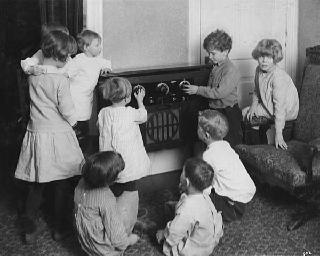
As aircrew I have spent many hours listening to HF radio, where the background hiss was nearly always present. You couldn’t listen to it for very long – bit like AM broadcasts. How to transform, not transfer, the past?
FM Radio brought clarity to the broadcasts. Gone were the days of music or the latest news slowly fading in and out, the hiss of the background noise affecting our listening. FM radio was to bring a new period of ‘wow’ to our enjoyment.

Then DAB, the new kid on the block arrived. We were told that FM radio was to be ‘no more’ the panacea to our radio ills. We rushed out perhaps to purchase a DAB radio and found so many stations available. They were all around the country…until you lived in a rural backwater. Then you found very few stations.
Then internet radio arrived. We could now listen to ANY radio station, practically anywhere.
Progress
I’ve noticed that when a new way of radio was announced, we all jumped onto the latest bandwagon. It was going to revolutionise our way of enjoying the radio. We could have done this incrementally, or in retrospect, taken a greater leap forward.
What of online church?
If we simply transfer traditional services into the online format, are we really making progress or just adding some window dressing to the ‘old normal’? What might it take, not to simply jump to the next step, but to make the next move a radical one? And is ‘online’ really the last step?
We don’t need to simply transfer what we know now, but transform to a new level.
What do we see in, say, Internet or DAB radio that is so different to AM radio?
Four pointers
Firstly, we have variety, variety that is given to the customer. The station doesn’t dictate everything but listens to its listeners. We should not be reproducing the long and glorious past in a new format because it worked then.
Secondly, we have that capability to engage with the producers. It isn’t just a listening service, but one where we may engage. Participation is key. It makes people know that they are in a true community.
Thirdly, the hosts are not the only ones to speak. Those who join in, have a say and a voice. Think of the advent of Radio 5 Live, of the wisdom from the many able to bring insight to the debate. Different forms of comment are allowed and encouraged. We hear the apparently silent as well.
Our faith is about dialogue. It isn’t just one perspective, one view, but where – around the fire – we can really understand the views of many people, and hear God.
I think this is vital with the latest focus upon #BlackLivesMatter. We desperately need to hear the stories from the other perspective.
Lastly, it isn’t just at 10:30 on a Sunday morning. There’s coverage throughout the week.
Where can we meet people and ‘be’ Christ? That’s discipleship, where our lives speak volumes, our actions show what our faith really means.

- So transform not simply transfer from the past.
- Participation is key.
- Need to hear all voices, not just the one at the front.
- More like 24/7 not just 10:30 on a Sunday morning.
“It’s for life, not for an hour”
What is your opinion? Let’s discuss so we can learn from everyone.